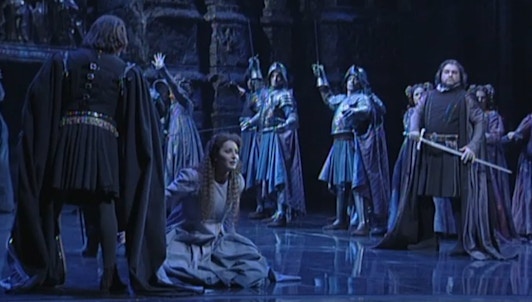Savatore Cammarano's libretto, based on Schiller's Kabale und Liebe, incorporates solely the elements from the original German drama that enable the characters to express their passions, leaving out the delicate political aspects of the story that risked censure. Verdi's fourteenth opera, the work was both commissioned and premiered on December 1849 by Naples' Teatro San Carlo. More modern than Verdi's previous operas, it precedes the composer's legendary trilogy Rigoletto, Il Trovatore, and La Traviata.
As Luisa Miller, Patrizia Ciofi displays the qualities for which she originally became famous in her performances of Gilda in Rigoletto. Nicola Alaimo plays the father, Miller, with his powerful, dramatic voice serving the character to great advantage. As Rodolfo, Gregory Kunde takes the stage of the Opéra Royal de Wallonie-Liège for the very first time. Those soloists are accompanied by the choir and orchestra of the Opéra Royal de Wallonie-Liège, conducted respectively by chorus master Marcel Seminara and conductor Massimo Zanetti, himself an expert of 19th century repertoire in general, and of Verdi in particular.
The setting is a small Tyrolean village in the 17th century. Luisa, an old soldier's daughter, and Rodolfo, Count Walter's son, are madly in love. The count, who wants his son to marry Duchess Fererica, sentences the old soldier to death and jails Luisa. Desperate to save her father, Luisa agrees to a plan concocted by the count's servant, Wurm, who is also in love with her: she will marry him and write a letter to Rodolfo pretending she never loved him, but had rather seduced him for personal gain. Torn apart by the terrible news, Rodolfo obtains some poison and goes meet Luisa to learn whether she betrayed him...
Picture: © Jacques Croisier 2014.
